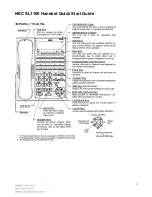
ABITIG
®
Little
1 Identification
EN
-
3
Table of Contents
1
Identification
EN
-
3
1.1
Marking
EN
-
3
2
Safety
EN
-
3
2.1
Designated use
EN
-
3
2.2
Basic safety instructions
EN
-
3
2.3
Electro-technical safety instructions
EN
-
3
2.4
Welding safety instructions
EN
-
3
2.5
Safety instructions regarding protective clothing
EN
-
4
2.6
Safety instructions for use
EN
-
4
2.7
Classification of the warnings
EN
-
4
2.8
Emergency information
EN
-
4
3
Product description
EN
-
4
3.1
Technical data
EN
-
4
3.2
Figures used
EN
-
5
4
Putting into operation
EN
-
5
4.1
Bending the flexible torch body (optional), Fig. 2
EN
-
5
4.2
Preparing the welding torch for cable assembly installation EN
-
5
4.3
Equipping the welding torch, Fig. 1
EN
-
6
4.3.1
ABITIG
®
Little 24 G/24 W/9/17/25:
EN
-
6
4.3.2
ABITIG
®
Little 150/260 W:
EN
-
6
4.3.3
ABITIG
®
Little 90/180 W:
EN
-
6
4.4
Shortening the tungsten electrode
EN
-
6
4.5
Sharpening tungsten electrodes, Fig. 3
EN
-
6
4.6
Connecting the cable assembly
EN
-
6
4.7
Connecting the coolant hoses
EN
-
6
4.8
Bleeding the coolant circuit
EN
-
6
4.9
Connecting the shielding gas and setting the gas volume
EN
-
6
5
Operation
EN
-
6
5.1
Handle operating elements
EN
-
7
5.2
Welding
EN
-
7
6
Putting out of operation
EN
-
7
7
Maintenance and cleaning
EN
-
7
7.1
Cleaning the welding torch
EN
-
7
7.2
Annual maintenance by an electrician
EN
-
7
7.3
Replacing wear parts, Fig. 4
EN
-
8
8
Disposal
EN
-
8
9
Warranty
EN
-
8
1 Identification
The TIG welding torches from the ABITIG
®
Little series are used for inert gas
welding with tungsten electrodes and inert gases. The welding torches
conform to EN 60974-7 and are not considered devices that independently
fulfil functions.
Arc welding can only be carried out in connection withawelding
power source.
1.1
Marking
This product fulfils the requirements that apply to the market to which it has
been introduced.
A corresponding marking has been affixed to the product, if required.
2 Safety
This chapter provides you with basic safety instructions and warns you
against residual hazards which must be observed in order to operate the
product safely.
Non-observance of the safety instructions may result in risks to the life or
health of personnel and result in environmental damage or material damage.
2.1
Designated use
The device described in these instructions may be used only for the purpose
and in the manner described in these instructions. In doing so, observe
the operating, maintenance and servicing conditions.
Any other use is considered improper.
Unauthorised modifications or changes to enhance the performance are
not permitted.
► Do not exceed the maximum load data specified in the documentation.
Excessive loads lead to irreparable damage.
► Do not make any constructive changes to the product.
► During welding work outdoors, use suitable protection against the
weather conditions.
2.2
Basic safety instructions
The product has been developed and manufactured in accordance with
state-of-the-art technology and the recognized safety standards and
regulations. The product can present design-related, unavoidable risks for
users, third parties, or other material property. The manufacturer will accept
no liability for damage caused by non-observance of the documentation.
► Please read the documentation carefully before using the product for the
first time and comply with the instructions contained in it.
► Only operate the product in technically perfect condition in compliance
with all documentation.
► Before carrying out specific work, for example commissioning,
operation, transport and maintenance, read the documentation
carefully.
► Use suitable means to protect yourself and bystanders from the hazards
listed in the documentation.
► Store the documentation within easy reach of the device for reference
and enclose all documentation when passing on the product.
► Consult the documentation for the other welding components.
► When handling gas cylinders, consult the instructions from the gas
manufacturers and the corresponding local regulations, e.g. pressurised
gas regulations.
► Observe the local accident prevention regulations.
► Have commissioning as well as operating and maintenance work
carried out exclusively by qualified personnel. Qualified personnel are
persons who, based on their special training, knowledge, experience
and due to their knowledge of the relevant standards, are able to assess
the tasks assigned to them and identify possible dangers.
► Ensure the work area is well lit and keep it in good order.
► For the entire duration of servicing, maintenance and repair work, switch
off the welding power source and the gas and compressed air supplies,
and disconnect the mains plug.
► For disposal, observe the local regulations, laws, provisions, standards
and guidelines.
2.3
Electro-technical safety instructions
► Check electric tools for damage and for their proper functioning in
accordance with their designated use.
► Do not expose electric tools to rain and avoidamoist or wet environment.
► Protect yourself from electric shock by using insulating mats and wearing
dry clothing.
► Do not use the electric tools in areas subject to fire or explosion hazards.
2.4
Welding safety instructions
► Arc welding may cause damage to the eyes, skin and hearing. Please
note that other hazards may occur in connection with other welding
components. Therefore, always wear the required safety clothing in
compliance with local regulations.











































